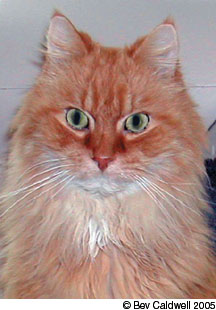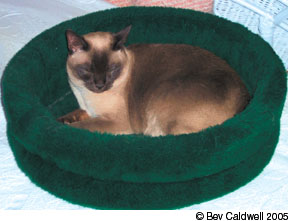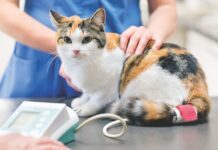Chester, a handsome orange and white polydactyl cat, still plays hide-and-seek with Pamela Perry, DVM, his human companion for nearly 18 years. Her soul mate cat, Chester was only five weeks old when Dr. Perry, an animal behavior resident at the Animal Behavior Clinic at Cornell Universitys College of Veterinary Medicine, adopted him.
He is a social, confident cat, Dr. Perry notes. Over the years, Chester has adapted to all kinds of change, including college, moves and other animals, and he has always gone with the flow. Now that hes older, he spends more time sitting on my lap, purrs constantly and really seeks out my attention, she says.
Since entering his late teens, Chester has dropped weight and lost some hearing, but there is a good side to that, Dr. Perry adds. For example, the sound of thunder no longer scares him.
While a cats advancing years may bring health problems to tackle, its important to realize that aging is not a disease process. The goal is to recognize the changes that occur with age; we try to make cats more comfortable by adapting our care and their surroundings to the changes they experience, says Richard Goldstein, DVM, a board-certified specialist in veterinary internal medicine and an assistant professor of small animal medicine at Cornell Universitys College of Veterinary Medicine.
Thanks to improvements in nutrition, veterinary medicine and owner enrichment, the life expectancy of a healthy cat continues to rise in the 21st century. Today, cats are considered family members and are treated accordingly; they live inside and receive better care, says Dr. Goldstein.
As cats live longer, however, its more important than ever to pay attention to what is normal for them. While many cats remain healthy throughout their lives, age increases the odds of contracting an illness. Dont assume that a physical or behavioral change means your cat is simply getting old. Many things go hand-in-hand; even if you think your cat has a behavioral problem and not a medical one, it should be checked out thoroughly by a veterinarian, Dr. Perry says.
The changes associated with feline aging usually occur gradually, and commonly include the following:
Vocalization and disorientation. Sensory loss can affect an older cats ability to see, hear and respond. For example, an elderly cat whose sleep cycle gets altered or reversed may have trouble seeing at night and become disoriented – and then yowl loudly at night. Put nightlights around the house; stimulate your cat more during the day, so he will sleep better at night, Dr. Perry suggests.

216
Weight loss. Older cats may lose muscle mass and therefore appear thinner. This, along with thinning hair, means your elderly cat wont be able to stay warm as easily as when she was younger. Provide a comfortable, warm place to sleep away from drafts.
Weight gain. A cat may gain weight as her metabolism slows. We dont see a lot of coronary or other vascular disease in cats, but everything else associated with overweight people also happens to older cats, Dr. Goldstein notes. Unless theyre excessively thin, its important to give them fewer calories as they become less active.
Diets geared to older pets have larger amounts of fiber or other substances that give them a sense of satiety with fewer calories. Discuss your cats diet with your veterinarian. Note: A cat in good body condition without a weight or behavioral problem does not require a diet change just because of its age.
Less active lifestyle; stiffness. Elderly cats may display stiffness in joints as cartilage deteriorates and tissues lose moisture. Bones can become brittle, resulting in difficulty in jumping up or getting down, or even in stepping into a litter box. Arthritis often goes undiagnosed and untreated in cats, Dr. Goldstein says. Its amazing that, when you treat a pet for chronic pain, all of a sudden that pet looks three or four years younger than he is, he adds. Provide easy access, such as a step stool or ramp near a favorite piece of furniture, to avoid stress on bones and joints; consult your veterinarian about treating chronic arthritis pain.
Litter box blues. Inappropriate elimination can develop with older cats for several reasons, from disorientation and stiffness to an underlying medical problem. Throw in incontinence from lack of muscle tone, problems with constipation or diarrhea or the simple inability to step into a litter box, and you begin to grasp the problem. Think of your grandmother getting into a pickup truck, and youll get the idea, Dr. Perry says. Rule out medical problems first. A litter box with low sides may be the answer, or place more than one litter box in close proximity to your cat. Place litter boxes on every level of the house to reduce your cats need to climb steps. And of course, keep the boxes clean.
Cognitive dysfunction. Just as in people, some older cats will suffer from dementia or Alzheimers disease-like behavior. Cognitive dysfunction syndrome (CDS) is caused by physical and chemical changes affecting brain function. The result appears to be impaired mental function or senility. Signs of CDS may include confusion, aimless wandering, inappropriate elimination and altered sleep cycles. Your veterinarian can devise a course of management that may include drug treatment, an antioxidant diet and exercise.

288
Despite the changes that age brings, the cost of caring for your older cat will not necessarily soar. Older cats are more apt to have medical problems that result in higher veterinary bills, but if they are healthy, routine healthcare should be similar to that of a younger cat, Dr. Perry says. Plus, you dont have to worry about younger-cat expenses, such as spaying and neutering or treating injuries that young cats can be prone to, she adds.
The key is to schedule regular checkups, preferably at least every six months, to maintain good health and catch problems early. More veterinarians now offer geriatric exams for older cats that are taking the place of the annual vaccine visit, Dr. Goldstein says. A geriatric exam typically includes discussing a cats health history and a physical exam that may include blood work, a urine test and a chest X-ray.
Just as people over the age of 50 or 60 should do certain things to stay healthy, taking proper care of older pets makes sense too, he adds. And from a financial perspective, it is much better to do good preventive medicine than to try to treat problems when they are advanced.
Good medicine comes in many forms, of course. For instance, Dr. Perry gives Chester a pinch of catnip every now and then, which brings out the kitten in him. People always say laughter is such good medicine for us and makes us feel good; I think catnip does the same for cats.
Some Extra TLC Tips
Spend time with your cat. An older cat may want to play or just be held. Senior cats generally like to be petted; they often mellow with age and are more tolerant. Just because an older cat doesnt seek you out does not mean it doesnt want attention; it just may require too much effort to go to you, Dr. Perry says.
Be aware of your cats extra needs. Provide easy access to favorite places, litter boxes, food and water. Make sure your senior cat doesnt have to run the gauntlet between other, younger cats in the household or do acrobatics to get where hes going, Dr. Perry advises.
Due to sensory loss, elderly cats tend to be less responsive. When they do sense something, they may startle more. Dont surprise them with sudden moves, touches or noises. Patience and understanding are really important with older cats, because they give you so much back, Dr. Perry concludes.



